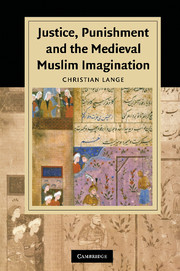Book contents
- Frontmatter
- Contents
- Acknowledgments
- List of abbreviations
- Introduction
- PART I THE POLITICS OF PUNISHMENT
- PART II THE ESCHATOLOGY OF PUNISHMENT
- PART III LEGAL DIMENSIONS OF PUNISHMENT
- 5 Circumscribing ḥadd in Sunnī law
- 6 Discretionary punishment (taʿzīr) and the public sphere
- Conclusion
- Bibliography
- Index of names
- Index of subjects
- Cambridge Studies in Islamic Civilization
6 - Discretionary punishment (taʿzīr) and the public sphere
Published online by Cambridge University Press: 21 July 2009
- Frontmatter
- Contents
- Acknowledgments
- List of abbreviations
- Introduction
- PART I THE POLITICS OF PUNISHMENT
- PART II THE ESCHATOLOGY OF PUNISHMENT
- PART III LEGAL DIMENSIONS OF PUNISHMENT
- 5 Circumscribing ḥadd in Sunnī law
- 6 Discretionary punishment (taʿzīr) and the public sphere
- Conclusion
- Bibliography
- Index of names
- Index of subjects
- Cambridge Studies in Islamic Civilization
Summary
Discretionary punishment (taʿzīr) and sodomy
As noted at the end of the preceding chapter, sodomy, including sodomy in homosexual relations, did not completely escape the threat of this-worldly punishment. Even the anti-ḥadd Ḥanafīs agreed that sodomites could be punished with taʿzīr instead of ḥadd. Commenting on the diverse punishments inflicted against sodomites by the Companions, Kāsānī for example points out that their difference of opinion indicates that they applied taʿzīr. This he infers from the fact that only taʿzīr allows for unrestrained personal reasoning (ijtihād) and, therefore, for difference of opinion (ikhtilāf). The divinely ordained punishments, on the other hand, are known strictly through reliance (tawqīf) on the Qurʾān, sunna, or consensus.
In general, as I have noted earlier, the historiography of the Saljūq period gives little information in terms of the punishments that sodomites were made to suffer. Whether from this lack of information one can gather that the jurists' discussions of sodomy remained “to a large extent theoretical,” and that “homosexual relations have always been tolerated,” however, is not immediately evident. There is at least one report dating from the Saljūq period that indicates that sodomites were the target of punitive prosecution. Ibn al-Jawzī relates that in the year 538/1143 in Baghdad a man was arrested on the charge of “immoral behavior” with a boy (yuqāl annahu fasaqa bi-sabiy). He was thrown into a pit, then made to climb the minaret of the Saʿāda madrasa, and pushed down to fall to his death.
- Type
- Chapter
- Information
- Justice, Punishment and the Medieval Muslim Imagination , pp. 215 - 243Publisher: Cambridge University PressPrint publication year: 2008



